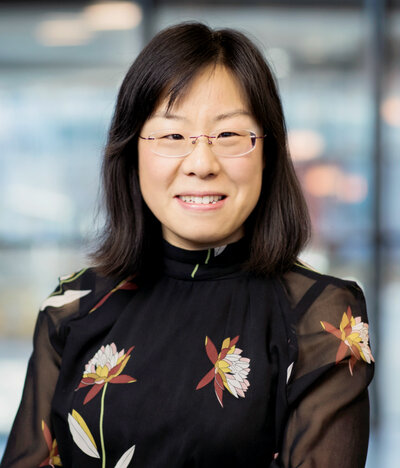Shuxia Tao
Department / Institute
Group

RESEARCH PROFILE
Shuxia Tao is Associate Professor of Computational Materials Physics at department of Applied Physics, TU/e. Her research interests lie in the development and application of atomistic and multiscale computational methods for the design of novel materials for solar energy and optoelectronic applications. A key feature of these materials and applications is their highly interdisciplinary nature, at the intersection of Chemistry, Physics, and Materials Science. Computational Materials Science is a powerful way to study the interplay of the chemistry and physics, providing new insights into the relation of the atomistic details of materials with their performance.
I use computer simulations to understand how electrons and ions interact with each other and how such interactions determine the formation, function and degradation of materials.
ACADEMIC BACKGROUND
With a Physical Chemistry background from Nankai University in China, Shuxia Tao started her PhD in 2007 at Department of Chemical Engineering and Chemistry, TU/e. There she learnt Computational Materials Science and earned her PhD in 2011 with a thesis on hydrogen storage in metal hydrides for battery applications. After a short career break to care for her children, from 2013 to 2016, she worked as a post-doctoral researcher at NWO physics institute NIKHEF for computational materials design for photodetectors.
Since 2016, she leads Computational Materials Physics Group at Department of Applied Physics, TU/e, where she was apointed Assistant Professor in 2018 and Associate Professor in 2023. Supported by several personal grants, CSER tenure track grant (2016), NWO START-UP (2019), NWO VIDI (2022), her group focuses on the devolepment of atomistic and multiscale computational methods for energy materials and optoelectronic materials.
Currently, her group has two main focuses: multiscale modelling of the growth of novel semiconductors and theory of light-matter interactions in the semicondutors. The ultimate goal is perfecting the quality of these materials via optimizing the synthetic chemistry and maximizing the efficiency for converting and storing solar energy and information. Her group is a part of Materials Simulation & Modelling (MSM) and a member of Center for Computational Energy Research (CCER), Eindhoven Institute for Renewable Energy Systems (EIRES), and Eindhoven Hendrik Casimir Institute (EHCI).
Key Publications
-
Mike Pols,Sofia Calero,Shuxia Tao
How fast do defects migrate in halide perovskites: insights from on-the-fly machine-learned force fields
Chemical Communications, ChemComm (2023) -
Mike Pols,José Manuel Vicent-Luna,Ivo Filot,Adri C.T. van Duin,Shuxia Tao
Atomistic Insights Into the Degradation of Inorganic Halide Perovskite CsPbI3
Journal of Physical Chemistry Letters (2021) -
Zehua Chen,Geert H.L.A. Brocks,Shuxia Tao,Peter A. Bobbert
Unified theory for light-induced halide segregation in mixed halide perovskites
Nature Communications (2021) -
Shuxia Tao,Ines Schmidt,Geert Brocks,Junke Jiang,Ionut Tranca,Klaus Meerholz,Selina Olthof
Absolute energy level positions in tin- and lead-based halide perovskites
Nature Communications (2019) -
Nengxu Li,Shuxia Tao,Yihua Chen,Xiuxiu Niu,Chidozie K. Onwudinanti,Chen Hu,Zhiwen Qiu,Ziqi Xu,Guanhaojie Zheng,Ligang Wang
Cation and anion immobilization through chemical bonding enhancement with fluorides for stable halide perovskite solar cells
Nature Energy (2019)
Ancillary Activities
No ancillary activities